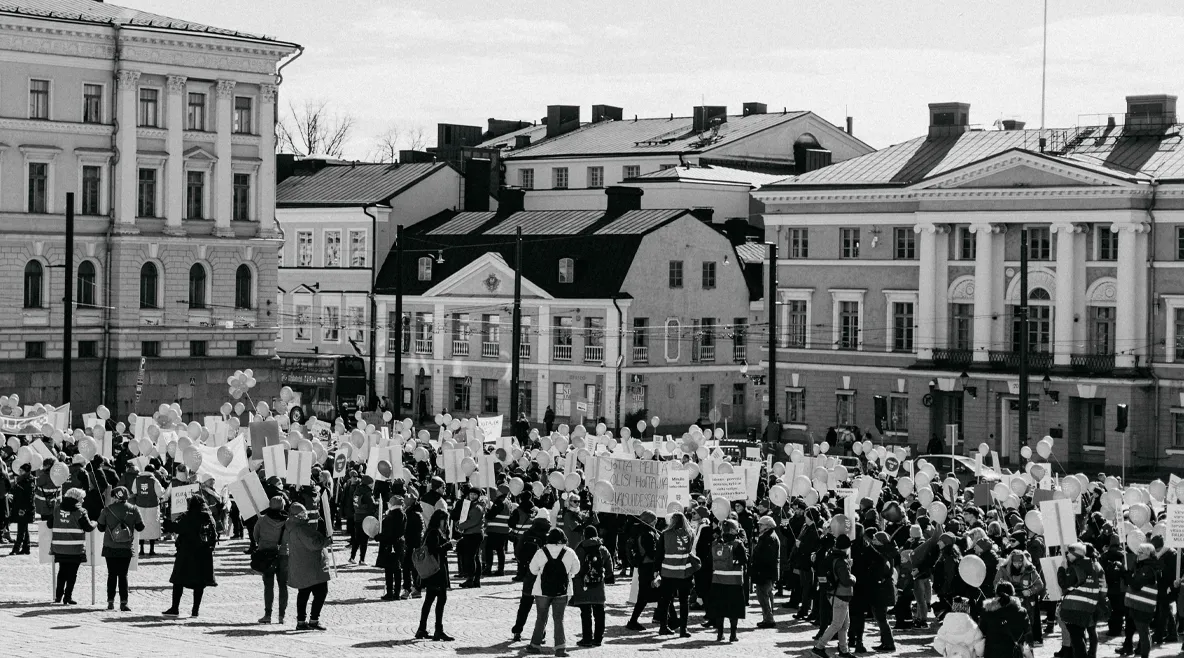Tehy pointed out several irregularities in the drafting process and filed a police report on them. Similarly, the parliamentary Social Affairs and Health Committee noticed several grave procedural errors.
The legislative proposal was considered by a total of 34 MPs in the Social Affairs and Health Committee and the Employment and Equality Committee. A majority of them, 25 MPs, found that the emergency work provisions were included in the proposal in a manner that was inappropriate and lacking.
As such, politicians are aware of the situation before voting on the bill, says President of the Tehy union, Millariikka Rytkönen.
– There is a lack of information on which to base the decision, and the Government cannot escape its responsibility if this bill is enacted, Rytkönen says.
This Wednesday, YLE reported that the Federation of Finnish Enterprises, in particular, manually guided the Ministry of Economic Affairs and Employment to include the provisions on emergency work, unrelated to essential work or industrial action, into the legislative proposal. This should not, in any way, be possible after the tripartite legislative drafting had ended, the hearing period for residents had expired, and the matter had been assessed by the Finnish Council of Regulatory Impact Analysis with completely different content.
– As unbelievable as it is, this is happening in Finland in 2025. The YLE article showed that amendments to the Working Time Act and emergency work, as defined in that Act, are in no way based on diligent preparation; instead, they were made against all rules, guidelines and principles of legislative drafting, Millariikka Rytkönen states.
YLE revealed that Markku Jalonen, Managing Director of Local Government and County Employers KT at the time, also attempted to influence the bill. In an email to Minister of Employment Arto Satonen, Jalonen wrote that "it would be good to talk about the emergency work group's situation. We need to block Tehy's and Super's chances of directly endangering Finnish people's lives and health (2007 and 2022)."
Tehy: Actual emergency work and its meaning suffer from inflation
Tehy is concerned about the impact of the bill on actual emergency work as originally defined by the law, meaning work that employers can, even now, assign to nurses in case of a major accident, for example. The emergency work appropriately assigned by an employer in a crisis suffers if MPs who are lacking information approve a bill based on which emergency work can be assigned on two completely different grounds.
– The actual emergency work and its significance will suffer from inflation if emergency work can be used as a pretence to order nurses to work during industrial action, which Petter Orpo's Government and its representatives are stubbornly attempting to achieve, Rytkönen says.
At the moment, all employees in the social services and healthcare sector share an understanding of the definition of 'emergency work.' Rytkönen describes that, in a real emergency, nurses will go to work at the employer's request 'at a moment's notice.' There is existing and functional legislation in place that everyone can understand.
Conversely, the bill being processed by the Parliament today will endanger actual emergency work and blur the lines as to what emergency work truly stands for and what measures are taken during a crisis. The confusion created by the Government is causing real risks to specialised healthcare.
If the Parliament passes a bill based on which emergency work can be used to break industrial action, the situation will be extremely confusing for nurses. It is also unclear what consequences an employee would face for refusing to carry out emergency work. The government proposal stated that an employee would not face consequences for refusing, but, according to the Constitutional Law Committee, a liability for damage would still exist. Now, the Employment and Equality Committee report states that employees cannot refuse emergency work.
– If sanctions are set out for refusing emergency work that breaks industrial action, nurses would have to be on standby during industrial action for the rest of their careers. It would be completely unreasonable and violate international law, Millariikka Rytkönen says.
Enquiries: Tehy President Millariikka Rytkönen, interviews through Special Advisor Mila Huovinen, [email protected], tel. +358 400 540 005


